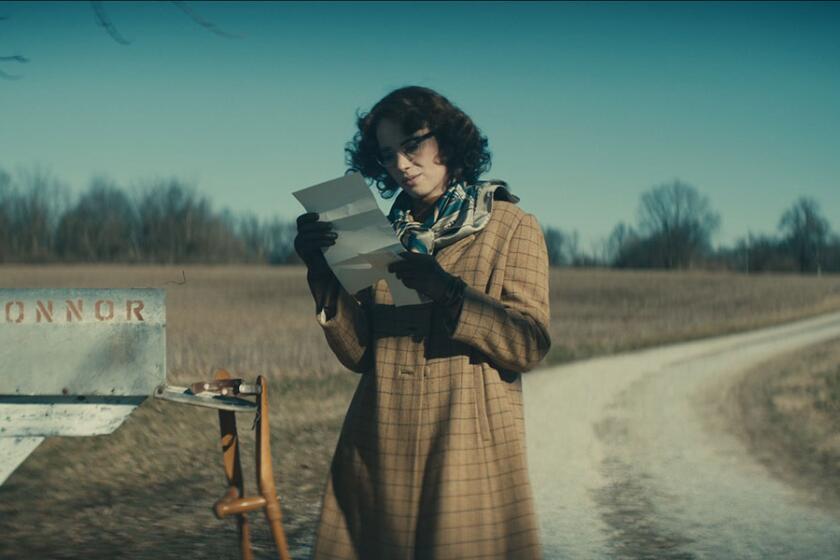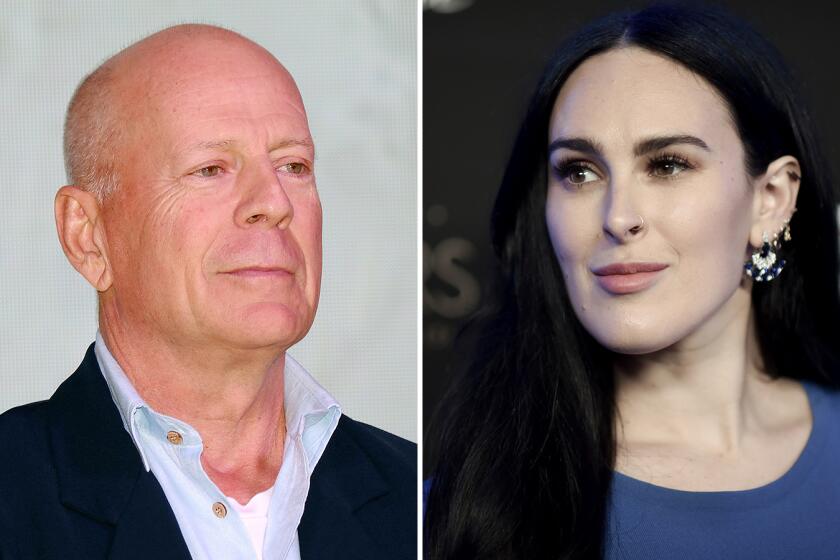MOVIE REVIEW : Distinction, Quality in ‘Vermeers’
Art is the process by which we reclaim or redeem life’s joys or horrors. Or is it?
In the beautiful and troubling “All the Vermeers in New York” (Hillcrest Cinemas)--one of the most remarkable American pictures so far in 1992--filmmaker Jon Jost tries, a bit like Dutch painter Vermeer himself, to suggest something larger, more harrowing, by focusing brilliantly on something small, bright and seemingly mundane. In telling his story of stockbrokers and actresses, painters and gallery owners in the waning ‘80s, he’s holding a mirror to a world both beautiful and corrupt, superficially calm and riddled with mad fears and disquiet.
Like the mirrors in Vermeer’s own works, doubling or tripling those photographic illusions of Delft in the 17th Century, Jost’s mirror both opens up 1980s Manhattan and drives us into a tiny cul-de-sac. He slakes our desire for visual beauty and then subverts it, showing us, among other things, how futile it is to try to escape from the pain or absurdity of the world into art--even the greatest art.
Jost’s story is simple: a pretext on which to hang his themes and observations. A stockbroker with a passion for Vermeers, Mark (Stephen Lack), sees a French actress, Anna (Emmanuelle Chaulet of Rohmer’s “Boyfriends and Girlfriends”) in the Metropolitan Museum of Art, and, infatuated, believes she resembles a Vermeer female. He pursues her, she resists, and the story glides to a bizarre, improbable, poignant conclusion.
If you mentally translated this odd, spare tale into literature, you might decide the ironies are too overt, the politics too obvious, the incidents too open and loose, the characters slightly archetypal and the ending too melodramatic. Even the film’s main comic interlude--in which an obnoxious painter (Gordon Weiss) demands an extravagant advance from real-life gallery owner Gracie Mansion, and then knifes out from the frame and walks off with one of his own paintings--lacks that veneer of civilized understatement we’d expect.
But Jost is after something different. Less than the story itself, he wants the experience. And, saturating the experience, he wants the theme. He wants to immerse us so fully into the imagined world of these superficial, selfish, but fragile and funny/sad people, that we’ll hang on every word and gesture. He wants to make the ordinariness of their lives palpable and meaningful, as he does the lives of the lower-class Americans he usually shows.
Like John Cassavetes, Mike Leigh and Jean-Luc Godard (who has called Jost the best current American filmmaker), Jost works with casts in an improvisatory way; on “Vermeers,” there isn’t even a writer’s credit. The beauty of his independent features--”Vermeers” had a budget of only $250,000--often lies in their sudden, spontaneous moments, the ways they evoke the lassitude, emptiness and sudden spurts of violence or griefthat typify most lives.
There’s an intricate relation between art and commerce, reality and recreation, at the heart of “All the Vermeers in New York,” which at first seems obvious too, and then becomes increasingly mysterious. All the “artists” we see--the painter, the actress, her opera-singing second roommate--are selfish or preoccupied with money, and the people with money or power, like Mark, treat them like children. Yet Mark is a child himself. He’s the one who wants to flee into art, make love to a chimera, hide in his own cul-de-sac from a world that, when he sees it from the top of the World Trade Center, fills him with revulsion.
Just as, while Vermeer painted, the Dutch Empire was collapsing--and New Amsterdam, which became New York, was lost--we are watching, in “All the Vermeers of New York” (Times-rated: mature, for language) the dissolution of a milieu, an era. And also of a man and a dream. It’s Jost’s strength that he sees all of them at once, blending them--humanity, dreams, society--until, in the radiant light of his moving picture, they glow with equal beauty and fire.
‘All the Vermeers in New York’
Emmanuelle: Chaulet Anna
Stephen Lack: Mark
Grace Phillips: Felicity
Roger Ruffin: Max
An American Playhouse Theatrical Film/Complex Corp. presentation, released by Strand Releasing. Director-cinematographer-editor Jon Jost. Producer Henry S. Rosenthal. Executive producer Lindsay Law. Music Jon English. With Gracie Mansion, Katherine Bean, Ariel Ainsworth, Gordon Joseph Weiss. Running time: 1 hour, 27 minutes.
Times-rated: Mature (Language, theme.)
More to Read
Only good movies
Get the Indie Focus newsletter, Mark Olsen's weekly guide to the world of cinema.
You may occasionally receive promotional content from the Los Angeles Times.






